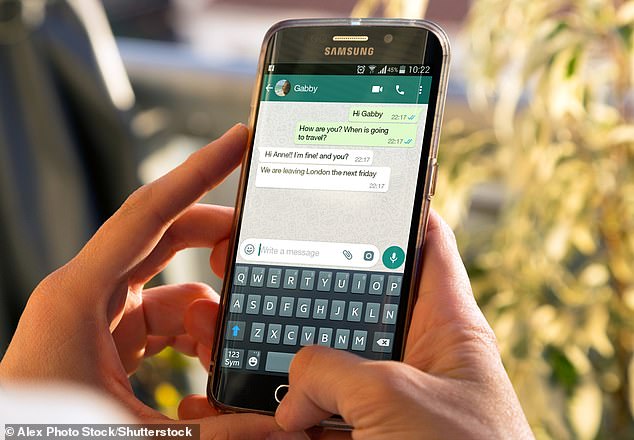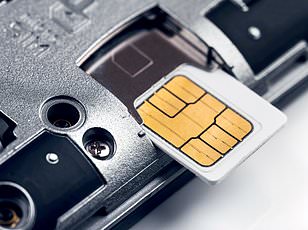Experts urge Britons to STOP sending SMS text messages - amid fears hackers could intercept data
- READ MORE: The 'dangerous' iPhone settings that are sharing your data
They've kept people in touch with friends and family for more than a quarter of a century, but the era of SMS messaging may finally be over.
Experts warn that the 'outdated' technology – which was developed in Europe in the 1980s – puts your messages at risk of being intercepted by cybercriminals.
Instead, the public should be using 'encrypted' apps like WhatsApp, which turn your messages into secret code that can only be deciphered by the recipient.
Dan Lattimer, cyber expert at software firm Semperis, told MailOnline: 'SMS lacks encryption, making it more vulnerable to interception, spoofing, and other forms of unauthorised access.
'From a security perspective, transitioning from SMS to encrypted messaging apps like WhatsApp, Signal, or others may be prudent, especially when communicating sensitive or personal information.'
John Kingston, cyber security lecturer at Nottingham Trent University, called SMS messaging 'an old technology' and 'therefore vulnerable in more ways than one'.
'SMS has many of the same vulnerabilities that emails do, such as sending fake phishing links or flooding recipients with masses of unwanted messages,' he told MailOnline.
'But SMS messages can actually be intercepted and redirected to another phone.'

As the average millennial will remember, SMS was an integral part of using a mobile phone, whether you had the Nokia 3310, the BlackBerry and the Motorola Razr
SMS, which stands for ‘short message service’, was devised in the 1980s but hit its heyday around the turn of century.
It was in December 1992 that the very first SMS message – simply reading 'Merry Christmas' – was sent by British engineer Neil Papworth from his computer to colleague Richard Jarvis, who received it on his Orbitel cordless telephone.
As the average millennial will remember, SMS was an integral part of using a mobile phone, whether you had the Nokia 3310, the BlackBerry or the Motorola Razr.
SMS is typically transmitted over mobile or 'cellular' networks – the vast equipment that enable wireless communication between mobile devices.
But fast-forward 25 years and the technology has been superseded by apps such as WhatsApp, Signal and Signal, which use end-to-end encryption (E2EE).
Now considered a privacy standard, E2EE 'scrambles' messages into code which can only be unlocked and translated by the receiver – and no-one in-between.
SMS messages, on the other hand, are not encrypted end-to-end, which means that they could be intercepted or read by anyone – such as hackers or even your mobile carrier.
'An SMS message is sent in plain text, meaning there is no encryption,' Mr Lattimer, added.

The the very first SMS message - simply reading 'Merry Christmas' - was sent by British engineer Neil Papworth in 1992 (pictured here in a more recent photo). More than 30 years later, SMS messages are still sent by millions all over the world using texts, videos and emojis

The world's first text message was sent in December 1992 by engineer Neil Papworth from his computer to colleague Richard Jarvis and simply said 'Merry Christmas'.
'This means that the content of your messages can be easily intercepted and read by unauthorised parties.
'Additionally, your mobile provider stores these messages along with data such as the sender and recipient phone numbers, granting them full access to your communications.'
Mr Lattimer said SMS 'can be considered dated', but permanently abandoning SMS is 'not entirely practical' because it 'continues to serve some essential roles'.
For example, SMS is still helpful for two-factor authentication (2FA) – which sends a code to your smartphone to get into your online accounts.
It also remains 'universally accessible', Mr Lattimer said, in the sense that it can be used in areas where internet connectivity is unreliable.
He added: 'A balanced approach might involve using secure messaging apps whenever possible, especially for private conversations, while reserving SMS for cases where accessibility is a concern.'
'With all older technology it can be modernised and security can be embedded in the future.'
Marc Rivero, researcher at cybersecurity firm Kaspersky, agreed that SMS 'still has its place', while calling it 'outdated in terms of security'.

SMS has largely been superseded by messaging apps like WhatsApp (pictured) which uses end-to-end encryption


Android phones use Google Messages (left) for sending and receiving SMS messages (as well as encrypted messages) while iPhones use iMessage (right)
'SMS works without internet access, on basic phones, and as a fallback for two-factor authentication (2FA) when no alternatives exist,' Mr Rivero said.
'But privacy and security, messaging apps are far superior because of their encryption and protections against interception.'
Meanwhile, Luke Dash, CEO of ISMS.online, said people don't need to stop using SMS entirely, but that 'it’s a good idea to switch to more secure messaging apps where possible'.
The most popular messaging app with EE2E is Meta's WhatsApp, but other options include Telegram, Signal and even Facebook Messenger.
Android phones have a pre-installed app called Google Messages for sending and receiving messages, while iPhones use iMessage – but both have E2EE too.
The problem is, Google Messages only uses E2EE when it's sending a message to another Android phone, while likewise iMessage only uses E2EE when it's sending to another iPhone.
So if you're sending from Google Messages to iMessage or vice versa, your device will switch to SMS.
That's why the likes of WhatsApp, Telegram and Signal are generally considered more secure options, because they always use E2EE.

Vendors of so-called 'lawful intercept' spyware, such as RCS Lab and NSO, usually claim to only sell to entities that have a legitimate use for surveillanceware such as police forces fighting organised crime or terrorism, Lookout says. However, there have been many reports, especially in recent years, of spyware being misused (file photo)
Sachin Bhatt, technical director at CyXcel, said encrypted platforms like WhatsApp are safer for communication, but 'they are not fully safe'.
He pointed to mobile phone 'spyware' – dodgy software that steals information from a device – including Pegasus created by Israeli cybersecurity firm NSO Group.
'The Pegasus scandal showed that popular end-to-end encrypted platforms such as WhatsApp have also been compromised,' Mr Bhatt said.
'Moreover, with the advancement in quantum computing for intelligence gathering, encryption methods which are believed to be secure today may not be in the near future.
'If threat actors are able to harvest encrypted data, they may be able to later employ sophisticated techniques and methods to decrypt these datasets.'
Danny Howett, technical director at CyXcel, also warned of SMS messages containing links to download malware.
Malware embedded into rogue applications often requests permission to access SMS, allowing attackers to read messages,' he told MailOnline.
'Whilst E2EE apps are less susceptible to interception, users should remain vigilant about device security, phishing attacks, and app settings to maximise protection.'









































































































































 Weather warning as life-threatening polar vortex will engulf parts of the US with Siberian air: 'There's no escaping'
Weather warning as life-threatening polar vortex will engulf parts of the US with Siberian air: 'There's no escaping'